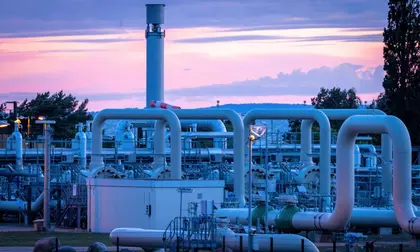Since Monday, the gas flowing through the Russian-German Nord Stream 1 pipeline, which mainly supplies north-western Europe, has been cut off due to routine maintenance work. Many fear that Moscow will use this opportunity to cut off gas to Europe entirely and build up political pressure. Berlin has already announced plans to return a pipeline turbine that was in Canada for repairs to Russia – despite the sanctions. Europe’s press says there’s no need to panic, but it does see the need for action.
Today, Europe’s press debates Nord Stream 1 and Europe’s reliance on Russian gas. Here are some opinions from a selection of European publications presented by eurotopics.
Counterproductive scaremongering
The Standard urges restraint:
“Russia would also shoot itself in the foot with a total blockade. But since the invasion of Ukraine, little is rational anymore. In any case, panic, as is currently being stirred up, is a poor advisor. This is just as useless as the alarmism with which sweeping and at the same time diffuse warnings of a loss of prosperity or even impoverishment of large sections of the population are being issued. … Talking about the end of the world seems exaggerated. What is urgently needed, however, is clarity about the coming economy of scarcity. … Here the government is being remiss, and that is fuelling fears. The people can cope with the truth.”
Moscow wants to enjoy best of both worlds for now

EU Transfers €1.5 Bln Raised From Russian Assets for Ukraine
The Irish Examiner believes that Russia will not really get serious about gas for a few months:
“Once Russia stops shipments completely, it can no longer apply pressure. Tactically, Moscow is likely to keep some gas moving, retaining the option of cutting or slowing flows whenever it chooses. … For now, however, the Kremlin will continue to enjoy the best of both worlds: high revenue and compelling leverage. To achieve its objectives, Russia needs to continue selling some gas into Germany, but at reduced rates, as it’s currently doing. … At some point, Moscow will completely turn off the tap, probably just before the winter, to try to bring the German economy to its knees.”
Reduce dependence step by step
El Periódico de Catalunya calls for energy alternatives:
“It seems more sensible to deal with the reality created by the war step by step, starting with its economic impact. In the case of gas this can be done by looking for alternatives, increasing production in the Gulf states, or through agreements with Venezuela or Iran which seemed unthinkable a few months ago. … The full range of measures available to the EU and its citizens must be applied: the reduction of gas and electricity consumption, the search for alternative gas sources and, in the longer term, the acceleration of the energy transition.”
Berlin bowing to pressure from Moscow
Germany is playing tricks, Corriere della Sera fumes:
“Withholding technical and industrial spare parts [like the turbine] is considered the most effective weapon in Europe’s hands to weaken Russia and its regime. Siemens had sent Gazprom’s turbine to Canada for repair, where it was held back because of the sanctions. Then two days ago, the twist came that sent Zelensky into a rage: [Green] economics minister Robert Habeck demanded and obtained the return of the turbine from Canada to Germany so it could be sent back to Russia. … It is with a heavy heart that this is being done, Habeck explained, but Nord Stream’s capacities are needed to fill the gas storage facilities. If this doesn’t pave the way for breaking the sanctions, it’s not short of it.”
Waiting in trepidation
Lidové noviny writes:
“[A permanent supply freeze] would make it impossible to fill the EU’s underground gas storage facilities, which play a key role during the winter months. … The population doesn’t yet seem to be fully aware of the gravity of the situation. But the politicians and business leaders in the EU know what it would mean if there were not enough gas in the winter. They are biting their nails and praying that the Russians won’t shut down Nord Stream 1 forever. So let’s hope that 11 July 2022 will not go down in history as the 9/11 for the European economy.”
Threat of Germany being permanently weakened
Expressen also fears long-term consequences:
“In our part of the world, we are facing a winter with acute energy shortages. … This will not be like anything we have seen before. The energy crisis is worrying not only in the short term but also beyond the Ukraine war. Germany is at risk of a protracted industrial crisis in the wake of its irresponsible energy policy. What happens if Germany – Europe’s engine – is permanently weakened? That could be one of the greatest upheavals of our time.”
You can also highlight the text and press Ctrl + Enter






